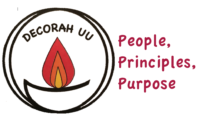Famous UUs
 Rachel Carson (May 27, 1907 – April 14, 1964)
Rachel Carson (May 27, 1907 – April 14, 1964)
Carson is considered the founder of the modern environmental movement. Her book Silent Spring galvanized the public to the dangers of man-made toxins and led to a ban of DDT, which was decimating populations of songbirds and raptors. Yet… she was more poet than provocateur. As she said, the gift she would impart to every child is an indestructible sense of wonder — glad appreciation of the everyday miracles of singing birds and silver rain — for “it is not half so important to know as to feel.”
 Julia Ward Howe (May 27, 1819-October 17, 1910)
Julia Ward Howe (May 27, 1819-October 17, 1910)
Little known today except as author of “The Battle Hymn of the Republic,” Howe was famous in her lifetime as poet, essayist, lecturer, reformer and biographer. She worked to end slavery, helped to initiate the women’s movement in many states, and organized for international peace.
 Rod Serling (December 25, 1924-June 28, 1975)
Rod Serling (December 25, 1924-June 28, 1975)
Serling, one of television’s most prolific writers, is best known for his science fiction television series, The Twilight Zone. He believed that the role of the writer was to “menace the public conscience.” Throughout his life Serling used radio, television, and film as “vehicles of social criticism.”
 Benjamin Rush (December 24, 1745-April 19, 1813)
Benjamin Rush (December 24, 1745-April 19, 1813)
A signer of the Declaration of Independence, Rush was the most celebrated American physician and the leading social reformer of his time. He was a close friend of both John Adams and Thomas Jefferson and corresponded with many of the prominent figures of the revolutionary generation. Rush’s strong belief in universal salvation helped to promote acceptance of Universalism during its formative period in America. Rush was a pioneer in the study and treatment of mental illness, Rush insisted that the insane had a right to be treated with respect.

You must be logged in to post a comment.